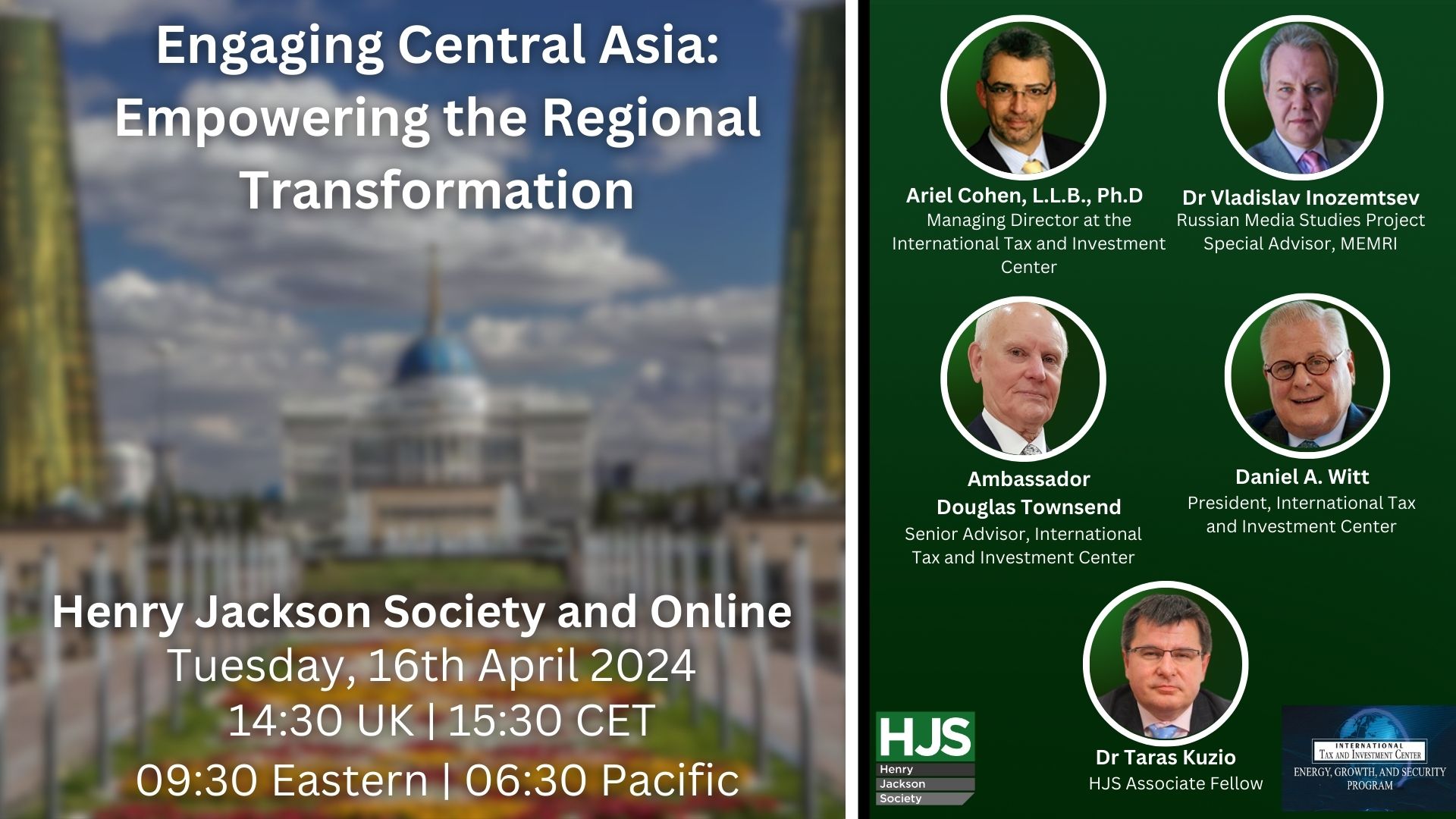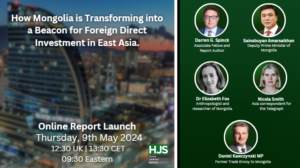Engaging Central Asia: Empowering the Regional Transformation

- This event has passed.
Engaging Central Asia: Empowering the Regional Transformation
16 April @ 2:30 pm - 4:00 pm

Central Asia’s vast energy resources and potential transit routes between Europe and Asia create valuable opportunities to source and transport necessary materials without reliance on Russia. Additionally, the region’s geographic position between nuclear-armed Russia, China, India, and Pakistan, as well as abutting a nuclear-aspiring Iran, makes engagement with the region an important step in establishing Europe’s more significant strategic presence. Missing the chance to form deeper relations with Central Asian nations would cost the West important business opportunities and deprive Central Asia of the chance to develop regional economies.
Today, Central Asia is undergoing a transformation, with nations in the region strengthening their political and economic independence, as neighboring power Russia is tied up in Ukraine, and the rising great power China is dealing with internal economic challenges.
The event will highlight Dr. Vladislav Inozemtsev’s report: Central Asia: Making Use of a Historic Opportunity, which advocates for Western powers to pursue deeper engagement with Central Asian nations and contribute to their development.
This would include assisting in the construction of the Middle Corridor, an ambitious transportation network that will connect East Asia, Central Asia, Europe, and the Middle East. Inozemtsev recommends more political and strategic dialogue, law enforcement working with businesses to combat corruption, and several other measures aimed at bringing political, strategic, and economic ties closer with Western nations.
The event will be in a hybrid format and will take place on April 16th, 2024, from 2:30 pm – 4:00 pm (BST), at the Henry Jackson Society, Millbank Tower, 21-24 Millbank, London, SW1P 4QP, with the option to attend online.

Ariel Cohen, L.L.B., Ph.D., is an internationally renowned expert on energy policy, Russia/Eurasia, Eastern and Central Europe, and the Middle East. He is a recognized authority on political and security risk management; economic development, investment policy; the rule of law; crime and corruption; market entry strategies; and other aspects of state/business relations.
Dr. Cohen is a Senior Fellow with the International Tax and Investment Center and Managing Director of the Energy, Growth and Security program. He also serves as a nonresident Senior Fellow at the Atlantic Council. He is a member of the prestigious Loisach Group at the George Marshall Center in Garmisch, Bavaria, Germany.

Vladislav Inozemtsev is a Russian economist with a PhD in economics. He is the Director of the Center for Post-Industrial Studies, which he founded in 1996. Between 2002 and 2012, he was editor-in-chief of Svobodnaâ Mysl’ as well as the publisher of the Russian edition of Le Monde diplomatique. From 2011 to 2014, he was a professor at Moscow State University (MGU) and the Higher School of Economics (HSE). From 2014 to 2018, he served as senior visiting fellow at the Institut für die Wissenschaften vom Menschen (Vienna), the Center for Strategic and International Studies and Johns Hopkins University (Washington), and the Polski Instytut Studiów Zaawansowanych (Warsaw). Dr. Inozemtsev is the author of more than 20 books and 500 publications in academic journals, as well as a columnist for Neue Zürcher Zeitung, La Razón, NRC (previously NRC Handelsblad) and Gazeta Wyborcza.

Douglas Townsend is an ITIC Senior Advisor and the Organization’s lead representative in the UK, in which capacity he coordinates ITIC’s regional initiatives in Eurasia and interacts with relevant national and international business and official agencies. Previously he served as Australian Ambassador (Kazakhstan, Hungary, Switzerland, Cote d’Ivoire, Senegal), Australian Investment Commissioner Europe, and Australian nuclear industry negotiator, following earlier diplomatic appointments in Austria, Vietnam, Ireland, and Pakistan. He worked in the Australian steel industry and newspapers before his government career.

Daniel A. Witt has been working to promote free markets and helping to lower the barriers to tax, trade, and investment in transition economies for over 30 years. Having worked with 85 countries, he has co-developed a unique neutral table to bring together the public sector, private sector, and academics to advance pro-investment economic policy reforms. Being among the first foreigners to discuss international tax and investment issues with the Russian Federation (1991), the Republic of Kazakhstan (1993), Vietnam (1996), Iraq (2004), Libya (2006), and Myanmar (2012), Mr. Witt is a recognized expert in newly opened-up frontier markets.
Mr. Witt is the President of the International Tax and Investment Center (ITIC), which he helped found in September 1993. ITIC is a global brand that is trusted as a reliable source of tax and investment policy and administration expertise.
The Republic of Kazakhstan has recognized Mr. Witt for his contribution to economic development. In 1999, he was elected an Honorary Professor of Economics at the Kazakh State Academy of Management. In 2011, Kazakhstan President Nursultan Nazarbayev presented Mr. Witt with the Order of Dostyk (Friendship), the highest honor bestowed to a foreigner.
Mr. Witt actively contributes to international and local nonprofit organizations. He is currently a G100 Denim Club Partner, part of the Group of 100 He-for-She Champions advocating for gender equality and economic empowerment of women. Mr. Witt is also Vice Chairman of the Board of Trustees of the Eurasia Foundation; an Advisory Board Member of Crystol Energy; and a founding member of the Editorial Advisory Board of the BRI Tax Journal. He also serves on the Council Executive Board and is the former District Chairman for the Boy Scouts of America in Washington, DC.

Taras Kuzio is a Research Associate at the Henry Jackson Society and Professor in the Department of Political Science, National University of Kyiv Mohyla Academy. His previous positions were at the University of Alberta, George Washington University, and University of Toronto, International Institute of Strategic Studies, German Marshall Fund of the US and Foreign Policy Institute, School of Advanced International Studies, Johns Hopkins University. Taras Kuzio is the author and editor of 24 books, including Russian Disinformation and Western Scholarship (2023); Fascism and Genocide: Russa’s War Against Ukrainians (2023); and Russian Nationalism and the Russian-Ukrainian War. Autocracy-Orthodoxy-Nationality (2022). He is the author of five think tank monographs, including The Crimea: Europe’s Next Flashpoint? (2010). He has authored 38 book chapters and over 130 scholarly articles on Soviet, Eurasian, Russian, and Ukrainian politics, national identity, geopolitics, and international relations.
***
EVENT SUMMARY
The Henry Jackson Society was pleased to host the Engaging Central Asia panel discussion with Dr Vladislav Inozemtsev, Ariel Cohen, Douglas Townsend and Daniel A. Witt, chaired by Dr Taras Kuzio. Dr Inozemtsev opened the discussion by emphasising the growing importance of the Central Asian region and the need for the West to invest, collaborate and forge deeper ties with Central Asian nations. Using Kazakhstan’s development as a template, Daniel A. Witt reinforced the urgency for change and development within the region. Crucially, the West’s key strength lies in economic engagement, as it must develop substantial reforms and build upon the vast potential of the middle corridor. The conversation turned to Ambassador Townsend, who stressed that the UK must increase institutional partnerships, such as through universities, and work to elevate the significance of Central Asia in public debate. Ariel Cohen underscored that high-level diplomatic collaboration must uphold the geopolitical balance in the area. Historically, Russia and China have held significant influence in the region, but the West must collectively foster a different path through investment, transportation, education and healthcare. In the subsequent Q&A session, attendees raised questions about how to formulate coherent decision-making to facilitate infrastructure projects in the region, how Russia might respond to the expansion of the middle corridor, and if there is a role for Mongolia or Turkey in supporting bilateral cooperation between the West and Central Asia.
This event can be watched both In-Person and Online.
To register for online attendance please click HERE. To register in-person, please submit your details in the form below.
RELATED EVENTS
The Dangers of US Isolationism
In contrast to Western democracies that seek economic growth and peaceful coexistence, a new set of autocrats has emerged, each with their respective territorial ambitions. Three of the most notable powers … Continued
How Mongolia is Transforming into a Beacon for Foreign Direct Investment in East Asia
Lord David Cameron’s April 2024 visit to Mongolia and Central Asia demonstrates the growing importance that London places on protecting and promoting British interests in the Indo-Pacific region. A new report … Continued




